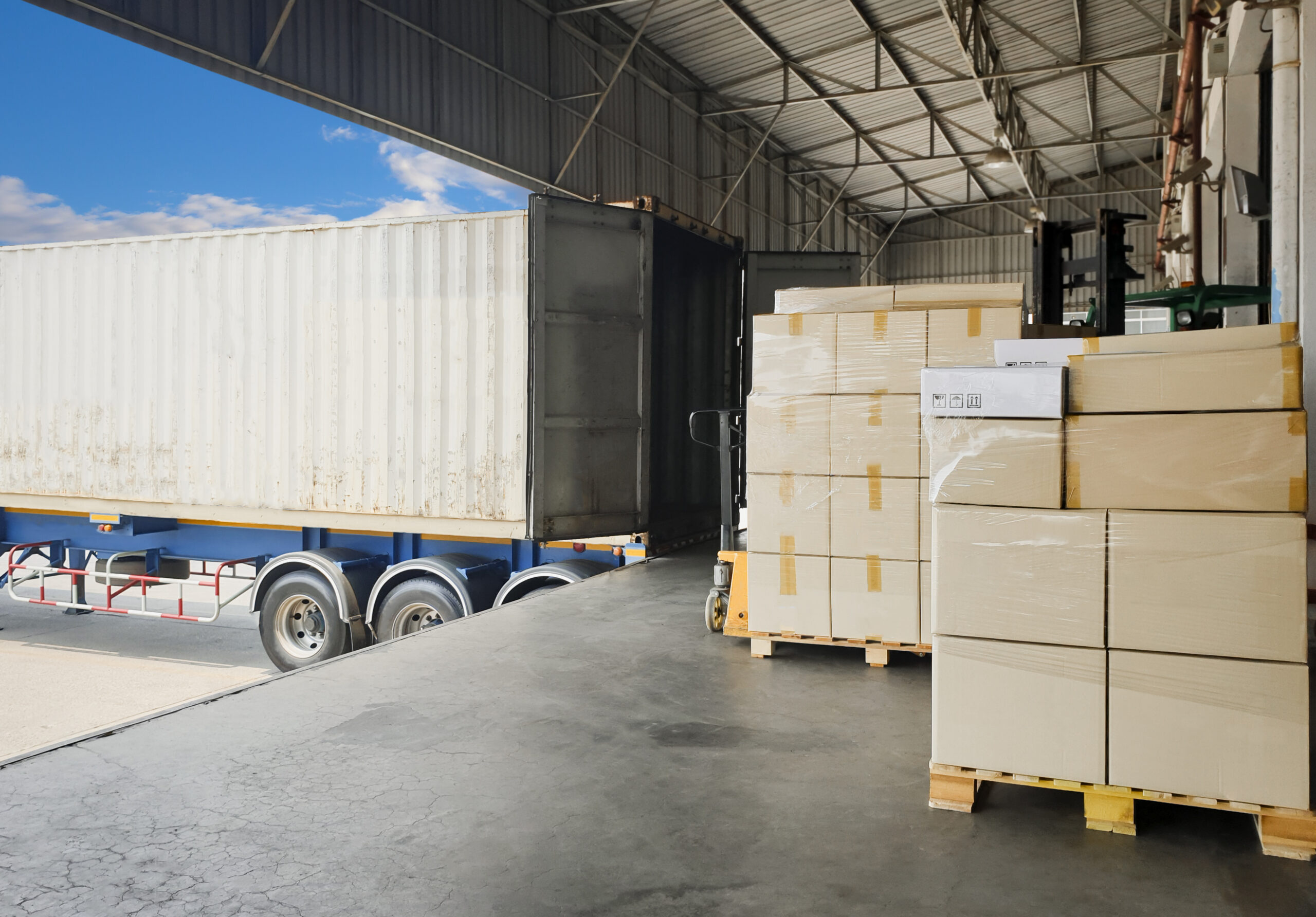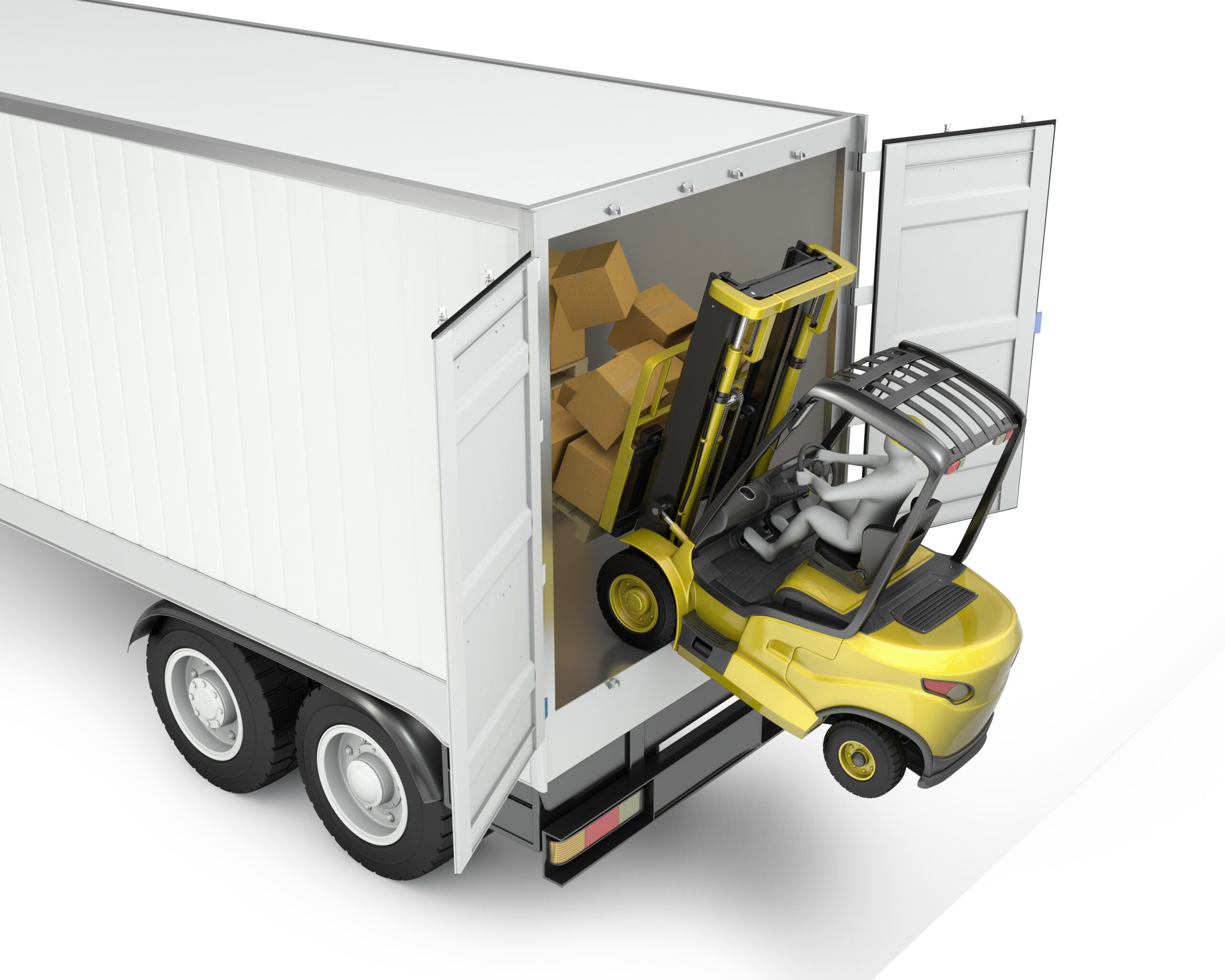Important Warehouse Function Meets Forklift Safety – See Our Tips
Unloading a tractor trailer is not an area where a forklift operator should decide to take a leap of faith. Better to have all systems secured and all forklift safety procedures strictly followed to ensure no incidents occur that could lead to operator injury or extensive product damage.
Studies show that about a quarter of all warehouse and distribution center accidents occur at the loading dock, where there is always a buzz of activity–trailers backing up to docks, forklifts, and pedestrians whizzing by, documentation being signed and exchanged.
Hence, it’s imperative to follow a strict set of guidelines to ensure a safe, efficient, and damage-free transfer of goods between the warehouse and the trailer–or rail car. Read on for some Forklift Safety tips.
6 Tips to Trailer Loading Safety

1. Make sure the trailer is safely and securely docked and ready to be loaded or unloaded – You should know what kind of safety systems your warehouse has for trailer docking. Depending on how old your facility is, it may not have some safety interlocks that more modern warehouses feature.
-
- Make sure to check the wheels of the trailer and vehicle.
- If the trailer is attached to a truck, be sure that the vehicle’s brakes are set. If the trailer is equipped with a glad hand (a coupling device used to connect the air lines from the truck to the trailer), disconnect it and use a glad hand lock. This will lock the trailer’s brakes in place.
- If the trailer has been dropped off and doesn’t have a vehicle attached to it, determine whether it needs jacks to shore up the front of the trailer. This will prevent ‘pop up,’ that is, the trailer tipping forward when a forklift drives into it.
- If a trailer has a flexible rear axle, move the wheels to the rearmost position before unloading.
- If your warehouse has a trailer restraint system (dock lock), make sure it is in place and securely attached to the trailer’s impact guards (ICC bars).
- Use caution when opening the trailer doors. The load inside the trailer may have dangerously shifted during transportation and may start tumbling out the door. This can even happen during short truck trips. If the warehouse has door security locks, use them.
2. Use the proper forklift. This may sound trivial, but make sure you are deploying a forklift that has the lifting capacity to pick up the pallets in the trailer. Check the height of the forklift to make sure you have enough clearance to enter the trailer with the mast elevated enough to pick up the pallets. Generally, a clearance of 2 in. is recommended. In some cases, a three-wheel forklift, with its greater maneuverability, may be more suited for unloading smaller trailers. In contrast, a four-wheel, higher-capacity forklift may be required for unloading heavier loads.
3. Communicate with the trailer driver. As odd as it seems, one of the biggest categories of accidents in transferring loads from or to a trailer is the driver pulling away and not knowing that the forklift operator is still in the process of carrying a load out of the truck. Oops! Forklift operators and truck drivers must establish communication and constantly check-in to make sure they’re both playing from the same sheet music. Often, the driver cannot see the forklift driver, so an alternate form of communication must be set up. Many warehouses have safety signal lights that alert drivers and forklift operators when it’s safe to begin unloading the trailer or to drive away from the dock. Some facilities require that the trailer driver leave the keys with a warehouse manager or the forklift operator during the unloading or loading process.
4. Inspect the trailer for damage. The condition of the trailer’s floor can severely impact the forklift’s ability to maneuver. Check to make sure the trailer has the weight-bearing capacity to hold the combined weight of its load plus the forklift weight. Also, check the trailer walls and ceilings for damage that could compromise the vehicle’s integrity.

5. While you’re loading or unloading…
-
- Be aware of potential ‘trailer creep,’ that is, forward movement of the trailer caused by the forklift repeatedly entering and exiting the trailer and shifting the trailer’s position.
- Use caution when using dockboards or dock plates. These can shift and cause an unstable surface for the forklift to travel over. Use extreme caution if dock plates are wet, snowy, icy, slick or if oil or hydraulic fluid has leaked on them. Clean them immediately. If the warehouse has automated dock levelers, be sure you know how to use them and set them to the proper height. Use fork height travel interlocks (if available) when loading or unloading over dock plates, especially if using walkies or pallet jacks.
- Drive your forklift carefully while inside the trailer. Sudden starts or stops and jamming into pallets can cause trailer creep or make the trailer’s jacks unstable.
- Before removing a load, make sure it is centered on the forklift and that the mast is tilted back to stabilize the load. A severely uneven load can cause a trailer to tip over. Load or unload pallets in an organized, sequential manner to avoid overloading one side of the trailer.
- Use extreme care when backing a forklift out of a trailer. Be aware of pedestrians, walls, and other obstacles, and maneuver carefully over dock plates.
- Keep the work area clean. Packing materials such as shrink wrap and metal pallet straps can interfere with your forklift’s operation and cause damage to the wheels and drive system.
6. Properly train all operators. Loading or unloading a trailer requires an extra level of skills, not only because of the inherent dangers of the operation but also because it requires a knowledge of the safety features of the dock and the ability to communicate with trailer truck drivers.

Apex Material Handling offers a wide range of products and services for warehouses, distribution centers, and manufacturing plants. We offer training so that your operators can become adept in the proper methods of loading and unloading tractor trailers. Make Apex your one-stop shop for all of your material handling needs in the greater Chicago area.
